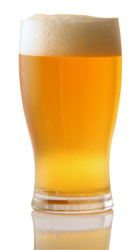
how long is your typical lager ferment?
#1

Posted 27 April 2010 - 01:45 PM
#2

Posted 27 April 2010 - 01:52 PM
I think it's usually a little under 2 weeks for me but I usually let them hang around in primary for at least 3 weeks.ETA: wyeast 2308, O'fests and Munich DunkelsHow long do you typical mid-gravity lagers take to reach FG?I've got a dunkel in primary and I'm wondering how long I should expect it to be there.
#3

Posted 27 April 2010 - 02:52 PM
#4

Posted 27 April 2010 - 04:05 PM
#5

Posted 28 April 2010 - 06:05 PM
The dunkel I have on tap now took 9 days to ferment, then I crashed it and hit it with gelatin. It was clear and carbonated and tasty 4 days later.My bohemian pils was brewed recently at a local brewery. We were drinking it clear and carbed 14 days after brewday. And it was best as fresh as possible.With a good pitch of yeast, o2, and temperature control, lagers shouldn't be taking too much longer than comparable gravity ales.I've got a dunkel in primary and I'm wondering how long I should expect it to be there.
#6

Posted 28 April 2010 - 06:29 PM
Yes, I bow to that common sense post. Good amount of yeast, O2, temp control and you can get a lager to the taps quicker than most people think. The long, extended lagering phase can help do some things but if you get these primary points nailed down right from the start, lagers can still be quick & delicious. Cheers.The dunkel I have on tap now took 9 days to ferment, then I crashed it and hit it with gelatin. It was clear and carbonated and tasty 4 days later.My bohemian pils was brewed recently at a local brewery. We were drinking it clear and carbed 14 days after brewday. And it was best as fresh as possible.With a good pitch of yeast, o2, and temperature control, lagers shouldn't be taking too much longer than comparable gravity ales.
#7

Posted 28 April 2010 - 08:26 PM
Edited by MolBasser, 28 April 2010 - 08:27 PM.
#8

Posted 29 April 2010 - 05:01 AM
No lagering at all, eh? I like the sound of that. If it tastes good, drink it, right?The dunkel I have on tap now took 9 days to ferment, then I crashed it and hit it with gelatin. It was clear and carbonated and tasty 4 days later.My bohemian pils was brewed recently at a local brewery. We were drinking it clear and carbed 14 days after brewday. And it was best as fresh as possible.With a good pitch of yeast, o2, and temperature control, lagers shouldn't be taking too much longer than comparable gravity ales.
Yeah, I'll definitely let it creep up to the mid-upper 50s for the last couple of days of fermentation.Make sure you let it heat up a bit before it finishes primary fermentation to clean up the diacetyl before you chill it to lager....MolBasser
#9

Posted 29 April 2010 - 06:00 AM
#10

Posted 29 April 2010 - 06:38 AM
#11

Posted 29 April 2010 - 08:56 AM
#12

Posted 29 April 2010 - 08:59 AM
But 14 days? I claim no knowledge about the specific practices at the major breweries, but I had heard it was like 4 weeks from pitch to bottle for the standard lagers.I think the big guys do turn their lagers around pretty quick. I've even seen some publications where they outline various techniques for turning over a lager quickly and how flavor profiles are affected. Basically they do what slainte said - pitch a ton of yeast and aerate. Lots of yeast and O2 can lead to slightly higher diacetyl production so a d-rest is a good idea as already mentioned.
#13

Posted 29 April 2010 - 02:39 PM
#14

Posted 30 April 2010 - 05:19 AM
#15

Posted 30 April 2010 - 05:32 AM
On average I'd say the krausen on my lagers doesn't make as high up the side of the fermenter as my ales.Do you all typically see less of a Krausen with your lagers. It's there on this dunkel, but it's pretty thin.
#16

Posted 30 April 2010 - 05:49 AM
+1On average I'd say the krausen on my lagers doesn't make as high up the side of the fermenter as my ales.
#17

Posted 30 April 2010 - 07:03 AM
Yep, very subdued fermentations. Mine are usually in a plastic primary so I can't see them, but I can tell what happened in there when I pop the top. Sounds like everything is going according to plan.Do you all typically see less of a Krausen with your lagers. It's there on this dunkel, but it's pretty thin.
#18

Posted 30 April 2010 - 11:01 AM
#19

Posted 30 April 2010 - 11:26 AM
It's wild because the sulphury smells can be really strong. I have experienced them at the end of primary and also closer to the beginning. My wife has told me that the basement smells like farts. Yes honey, I know... it's just lager. Miraculously, that aroma fades by the time the beer is served. Good luck!I'll take a hydrometer sample (and, more importantly, a taste test) tonight. Hopefully, it's moving along nicely. I've been out of town the last few days and when I came home last night I did notice that the fermentation had a bit of a sulfury aroma to it. Not that I was surprised by that, as I understand that's very common in cold fermentations, but it's just a different experience than most ales (except the hefe I did last year @62°F, that thing was a sulfur bomb!).
#20

Posted 30 April 2010 - 11:50 AM
Lagering is mainly used to clear the beer up, that's what smooths it out and gets rid of the "green beer" taste many people refer too. Traditionally that was the process, because they had no other way. Now many German brewers sterile filter their beer instead, and send their beer out as fresh as possible.No lagering at all, eh? I like the sound of that. If it tastes good, drink it, right?
Yeah, you generally won't get as much krausen with lager yeast.Do you all typically see less of a Krausen with your lagers. It's there on this dunkel, but it's pretty thin.
I wouldn't worry about it. It'll vent off with a way out and a little time. Many beers on tap around Germany have a little sulfur to them because they're so fresh.I'll take a hydrometer sample (and, more importantly, a taste test) tonight. Hopefully, it's moving along nicely. I've been out of town the last few days and when I came home last night I did notice that the fermentation had a bit of a sulfury aroma to it. Not that I was surprised by that, as I understand that's very common in cold fermentations, but it's just a different experience than most ales (except the hefe I did last year @62°F, that thing was a sulfur bomb!).
1 user(s) are reading this topic
0 members, 1 guests, 0 anonymous users













